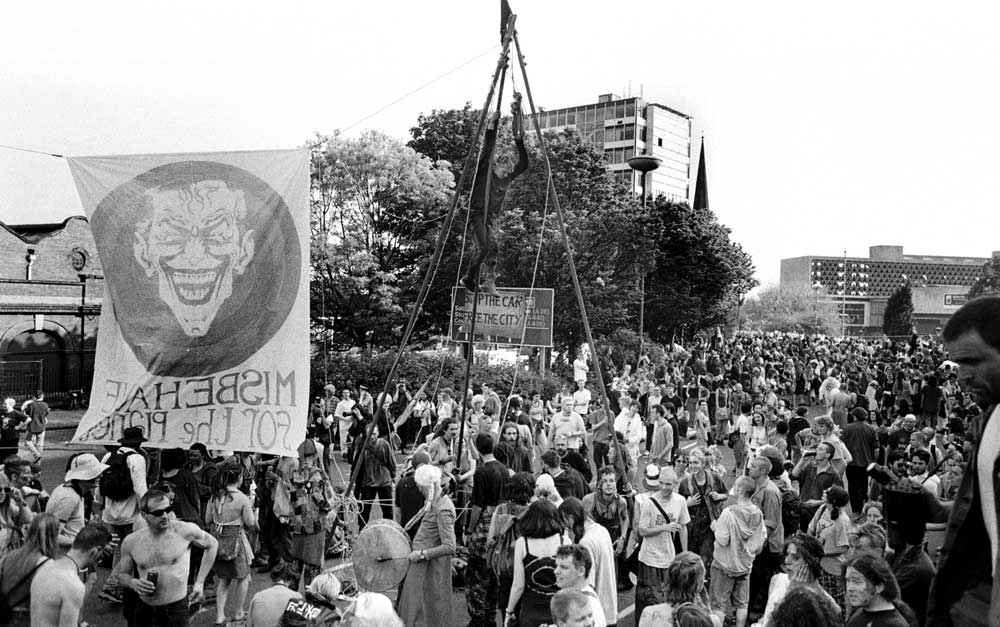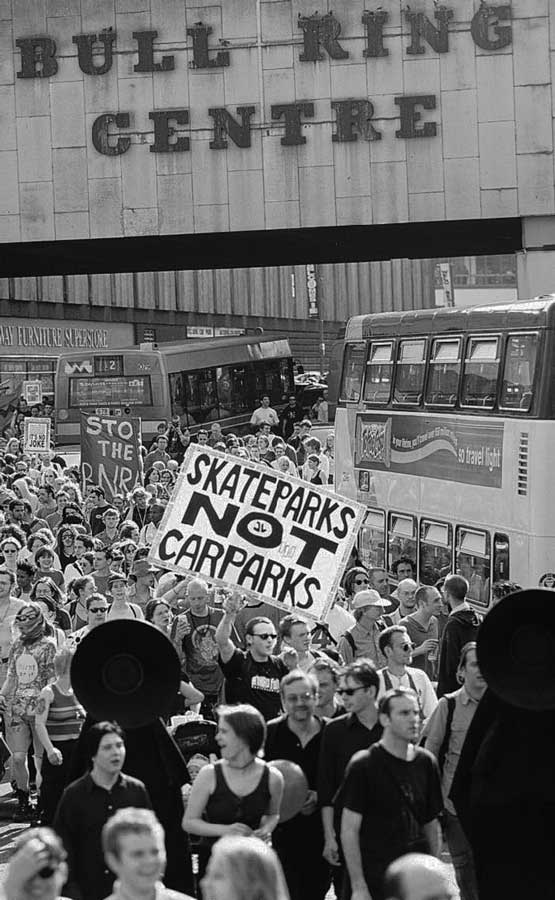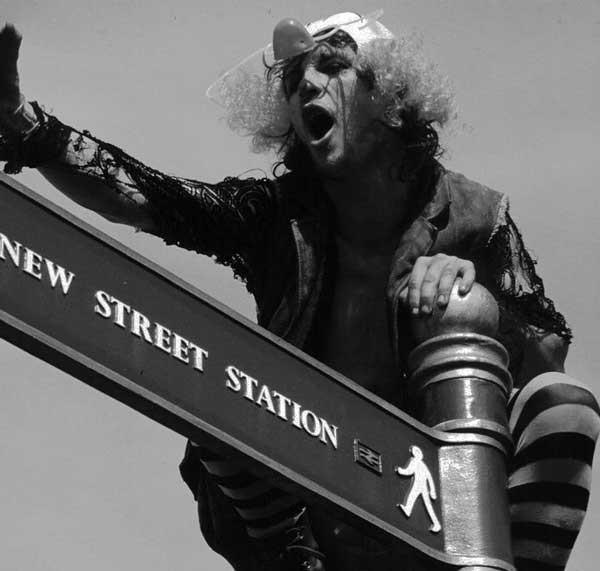

Resistance Allstars vs Globe Rotters
This May the temperature rose on the streets of the world. Protests and parties voiced mass opposition to international ‘free’ trade and economic globalisation coinciding with the G8 Summit in Birmingham and the World Trade Organisation 50th anniversary in Geneva.
Squall 16, Summer 1998, pp. 28-29.

Birmingham
Birmingham’s usually congested Bullring was taken over for an afternoon on May 16th as a mischievous crowd of thousands played volleyball and boogied to a mini-sound system under the eyes of twitchy riot police.
When the rotting lettuce and tomatoes thrown at the encroaching riot shields turned to bottles, the crowd, escorting the sound system, made a swift exit and left behind a handful of staggering Birmingham City fans to entertain the police.
When the intended after party squats were evicted, a Brummy nightclub kept truncheons from heads by letting everyone in cheap.
Elsewhere in Europe the parties turned into all nighters...
Prague
Over 3,000 protestors attended the Global Street Party in Prague on May 16th dancing to four sound systems in the city centre. Later in the day protestors targeted fast-food outlets McDonald’s and Kentucky Fried Chicken. Over 50 arrests were made and there were a number of injuries in clashes between protestors and police. There were reports of police using tear gas and truncheons to force demonstrators away from McDonald’s in Wenceslas Square. Paving stones were thrown through the burger giant’s windows.
Mainstream environmental groups were quick to distance themselves from the violence. However, many in the country perceive the disturbances as part of a growing disillusionment. Journalist Kate Connollly told Squall: “Eight and a half years ago, Czechs gathered peacefully in a week of demonstrations that brought down the country’s communist government without breaking a window.”
She believes the nature of May’s demonstration is seen by many in the city “to reflect the growing frustration of some young Czechs who feel that in its rush to embrace the free market economy, their society has lost sight of its tradition of humanist values.”
The evidence to support the protestors’ fears is clear.
For the first time homeless people are common on the city’s streets; increasing racism against Czech gypsies is a source of growing anger; unemployment is increasing and new drug laws in the Republic have banned the possession of any drug (previously possession for personal use was legal).
Geneva
In Geneva on May 16th an estimated 5,000 demonstrators gathered to protest against a 50th anniversary World Trade Organisation meeting in the city. World leaders Castro and Mandela were in attendance as well as the usual suspects: Clinton, Blair et al.
People’s Global Action, a worldwide alliance of groups fighting globalisation, organised a week of actions in opposition to the WTO and its policies, including a street party on the 16th. A massive exclusion zone was set up around the WTO and UN buildings (ie where protestors would want to protest) with a tiny area outside the Zone designated as ‘available’ for protestors to gather.
They gathered, and at the end of a day of partying the event had grown into what one eyewitness described as Geneva’s “biggest riot in memory - 5,000 people causing one million swiss francs worth of damage to the banks, McDonald’s and other multinationals”. Around 300 people were arrested over the following days.
A Geneva newspaper interviewed a local glazier who said his services had been booked by McDonald’s a week prior to the demonstration! He concluded they had been right to do so as he was called to replace windows at four “family restaurants” and three Pizza Huts that weekend. A police statement said over a hundred businesses had been damaged.
People’s Global Action (PGA), the direct action group who organised a week of street-based events in opposition to the WTO and its policies, said in a statement on the 17th: “We regret the damage to public property and to small shops during yesterday night.”
Actions throughout the city for the following four days led to further arrests, deportations, searches, rioting and injuries. An eyewitness, writing for SchNEWS, reported the occupation of multinational arms trader Lockhead’s offices and a spontaneous street demonstration stopping traffic on Monday 18th: “By lunchtime the United Bank of Switzerland was forced to close and police kept back while road after road was blockaded.” On Tuesday 19th, the reporter noted, “...the director of the WTO, Renato Ruggerio, told the conference that everyone must pedal faster towards globalisation, or face the danger of falling off (his Mercedes was later overturned).” He added that “according to staff at the hospital over 60 people a day have been treated, some requiring major operations”.
In their fervour to make arrests, police raided the Artamis building (a squatted centre and meeting place where PGA has an office) and arrested 64 people (including an outraged bus driver) who just happened to be there. Similar incidents occurred throughout the city. One newspaper reported the story of Tony Jeanneret, a 39 year-old father, who was on his way home from work at a puppet theatre in the city at 3am. He noticed a group of young people smashing a window and stealing CDs from a shop and approached them to ask what they were up to. As he was asking, police appeared on the scene: “I didn’t even have time to answer. I got violently hit from behind with a truncheon.” Lying on the floor, Mr Jeanneret saw three or four police running away. He was treated for an “open wound” on his head and other cuts and bruises. To add to his shock he was later visited and ‘interrogated’ by police and faces possible prosecution.
The events dominated the Swiss media, eclipsing the WTO meeting. However, as Squall went to press (almost a week after these events), only the Financial Times had covered the story in the UK, whilst events in Prague passed completely unreported in the British nationals.
Elsewhere people took to their streets for parties, critical masses and demonstrations: Toronto’s Action for Social Change reported that a major city street was blocked by hundreds of people but within two hours mounted Toronto Police were riding into the crowd “waving knives in the air to cut down ribbons and burst balloons.” Four people were arrested and charged with Unlawful Assembly.
In Turku, Finland, over a thousand people occupied a street and bridge. In Valencia, Spain, hundreds occupied a street for about five hours having first attempted to take the main market square but, as one Finnish street-reclaimer reported, the party had to move on “because the police isn’t a body which is made to dance”. Another Finnish street party in Helsinki is planned for July 25th.
In Berkeley, California, hundreds of cyclists, roller-skaters and skateboarders (“the rolling class”) and pedestrians (“pounders”) pushing couches, armchairs and carrying carpets (to make a living room in the street), made their way through the streets. During the party that followed, hand-painted games of twister were laid out and a donated car was smashed up along with numerous TV sets.
Further parties and demonstrations occurred in Tel Aviv, Israel; Ljubljana, Slovenia; Lyon, France; Brisbane & Sydney, Australia; Stockholm, Sweden; Utrecht, Netherlands and more...
London street parties to come: June 6th Meeting places: Euston Station and outside the Ritzy, Brixton at noon.
Related Articles
Globalised Resistance - The first Peoples Global Action conference in Geneva in February 1998 and the international neo-liberalism they are up against. Report by Gibby Zobel - Squall 16, Summer 1998.
Heard World - Gibby Zobel and friends attended the Peoples Global Action conference in Geneva and talked to a host of worldwide activists - Squall 16, Summer 1998.
For more articles about Anti/Alter-Globalisation Mass-Demonstrations - Click here
Links
Peoples' Global Action - www.agp.org *
Bothered (alternative news agency): bothered@pavilion.co.uk
* Wayback Machine link
